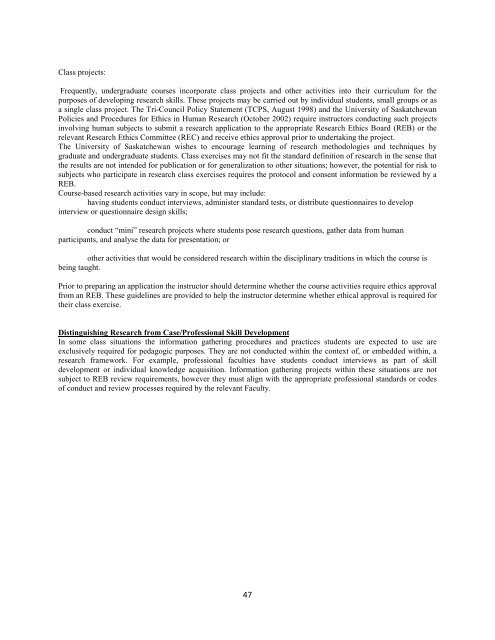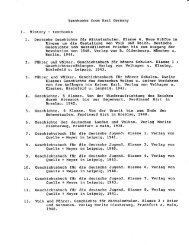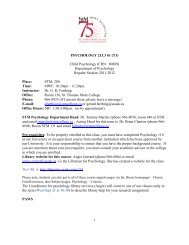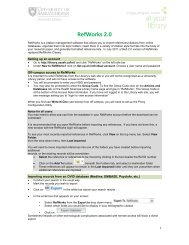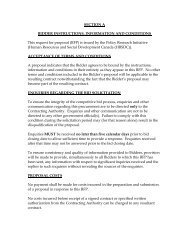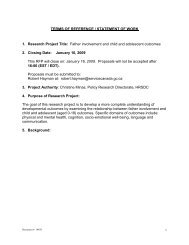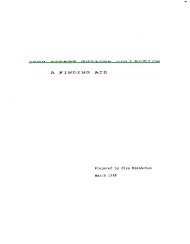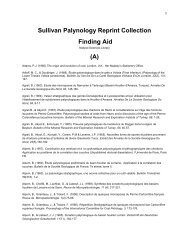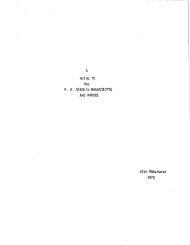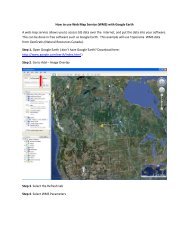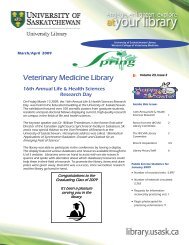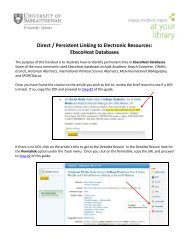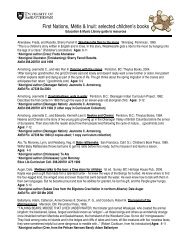St. Thomas More College, University of Saskatchewan Department ...
St. Thomas More College, University of Saskatchewan Department ...
St. Thomas More College, University of Saskatchewan Department ...
You also want an ePaper? Increase the reach of your titles
YUMPU automatically turns print PDFs into web optimized ePapers that Google loves.
Class projects:<br />
Frequently, undergraduate courses incorporate class projects and other activities into their curriculum for the<br />
purposes <strong>of</strong> developing research skills. These projects may be carried out by individual students, small groups or as<br />
a single class project. The Tri-Council Policy <strong>St</strong>atement (TCPS, August 1998) and the <strong>University</strong> <strong>of</strong> <strong>Saskatchewan</strong><br />
Policies and Procedures for Ethics in Human Research (October 2002) require instructors conducting such projects<br />
involving human subjects to submit a research application to the appropriate Research Ethics Board (REB) or the<br />
relevant Research Ethics Committee (REC) and receive ethics approval prior to undertaking the project.<br />
The <strong>University</strong> <strong>of</strong> <strong>Saskatchewan</strong> wishes to encourage learning <strong>of</strong> research methodologies and techniques by<br />
graduate and undergraduate students. Class exercises may not fit the standard definition <strong>of</strong> research in the sense that<br />
the results are not intended for publication or for generalization to other situations; however, the potential for risk to<br />
subjects who participate in research class exercises requires the protocol and consent information be reviewed by a<br />
REB.<br />
Course-based research activities vary in scope, but may include:<br />
having students conduct interviews, administer standard tests, or distribute questionnaires to develop<br />
interview or questionnaire design skills;<br />
conduct “mini” research projects where students pose research questions, gather data from human<br />
participants, and analyse the data for presentation; or<br />
other activities that would be considered research within the disciplinary traditions in which the course is<br />
being taught.<br />
Prior to preparing an application the instructor should determine whether the course activities require ethics approval<br />
from an REB. These guidelines are provided to help the instructor determine whether ethical approval is required for<br />
their class exercise.<br />
Distinguishing Research from Case/Pr<strong>of</strong>essional Skill Development<br />
In some class situations the information gathering procedures and practices students are expected to use are<br />
exclusively required for pedagogic purposes. They are not conducted within the context <strong>of</strong>, or embedded within, a<br />
research framework. For example, pr<strong>of</strong>essional faculties have students conduct interviews as part <strong>of</strong> skill<br />
development or individual knowledge acquisition. Information gathering projects within these situations are not<br />
subject to REB review requirements, however they must align with the appropriate pr<strong>of</strong>essional standards or codes<br />
<strong>of</strong> conduct and review processes required by the relevant Faculty.<br />
47


